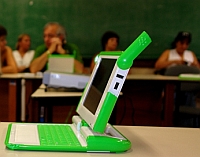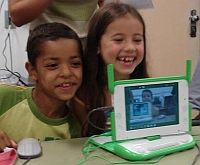If you read Ethan Zuckerman's excellent post, One Laptop Per Child: Just what sort of content do you load onto these puppies?, then you, like I, am somewhat reassured that in OLPC's quest to make each OLPC a Library of Alexandria, is not stopping at just 10 e-Books.
But what about all the other content for the Children's Machine XO? Specifically pedagogically-focused content for educators and students. Content that is conspicuously missing from the OLPC efforts to date, outside vague desires to follow Seymour Papert's Constructionism in lieu of more traditional educational models. Or as Ethan Zuckerman says:
In a little more than a month, 3,500 laptops will be distributed to schools in the nations who’ve agreed to pilot the laptop.One of the first to give that feedback will be the Brazilian project, Um Computador por Aluno (UCA), which is working with the Laboratório de Estudos Cognitivos (LEC/UFRGS) in the first OLPC in-classroom testing with 400 Children's Machine XO's at Escola Estadual Luciana de Abreu, in Porto Alegre, Brazil. If you wanna watch the pilot from space, OLPCitizen even has the Google Earth coordinates for the school.This debate about constructionism versus more traditional educational models will be informed pretty damned rapidly by the questions, concerns and feedback offered by teachers and students in the field.
At the announcement, Professor. Dra. Léa Fagundes, coordinator of the LEC/UFRGS, set the tone of the pilot: empowering children via technology, with this concise quote, (via Google Translation):
"Our main focus will be the development of people to create and to share knowledge, using itself the benefits of the technological net.Interestingly enough, LEC/UFRGS doesn't plan on building pedagogical models based around a one laptop per child configuration alone. Representatives of Uruguay and Argentina will also be involved as well in a seemingly pan-South American effort.We need to prepare the pupils so that they are creative agents. The tool goes to generate more knowledge and the constant exchange of experiences and information between the proper children".



